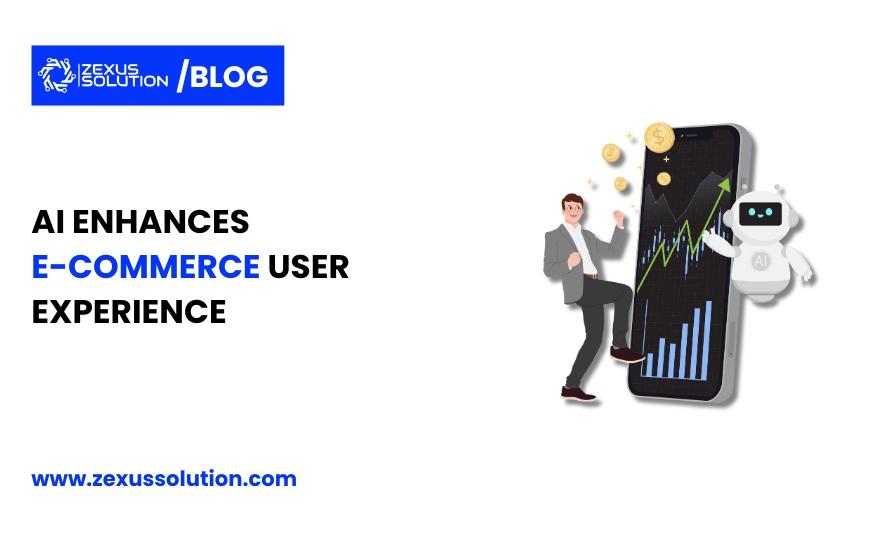Table of Contents
Don’t movie names like Ex-Machina, Chappie, or Blade Runner come into your mind when hearing the word “ Artificial Intelligence”? But when it comes to e-commerce, it’s not about human-like robotics but more like getting to know the new technologies and algorithms that provide the foundation.
Artificial intelligence (AI) has changed the e-commerce industry, with the world’s spending on AI technology within the e-commerce sector set to reach over $8 billion by 2024. By applying AI technology, businesses can now give personalized product recommendations, tell about future trends and demand, improve customer service through chatbots, smooth supply chain management, and create amazing shopping experiences through visual search.
This blog will explore how AI is revolutionizing UX on e-commerce websites, focusing on the core keyword “e-commerce website services” while also integrating related topics such as professional web development services, technology for custom mobile app development, and the future of web development.
Personalization Through AI

One of the most impactful applications of AI in e-commerce is personalization. AI algorithms analyze vast amounts of data, including browsing history, purchase patterns, and user preferences, to deliver personalized experiences.
For instance, AI-driven recommendation systems can suggest products that a user is likely to buy based on their past behavior and interests. This not only enhances the shopping experience but also increases conversion rates and average order values.
Amazon, a pioneer in e-commerce, uses AI to provide personalized product recommendations. Their sophisticated algorithms analyze user data to offer suggestions that are highly relevant to individual customers. This personalized approach has been a significant factor in Amazon’s success, demonstrating the power of AI in enhancing e-commerce website services.
Improved Search Functionality
Effective search functionality is important for many e-commerce website services. AI algorithms improve search engine abilities by learning about natural language queries and predicting user intent. Traditional keyword-based searches often fail to convey good results, but AI-powered search engines can interpret context, synonyms, and user behavior to provide more relevant results.
For example, if a user searches for “affordable wedding dress,” an AI-driven search engine can easily understand the intent behind the query and display a range of budget-friendly wedding dresses. This level of accuracy and relevance enhances the overall user experience, making it easier for customers to find what they want.
Enhanced Customer Service

Customer service is an important component of e-commerce website services. AI has changed customer service through the use of chatbots and virtual assistants. These AI-driven tools can handle a wide range of customer queries, providing instant responses and support 24/7. This not only improves customer satisfaction but also reduces the workload on human support teams.
AI chatbots can assist with order tracking, answer frequently asked questions, and even handle returns and refunds. They can also escalate more complex issues to human agents when necessary, ensuring that customers receive the best possible service. Companies like Shopify and Zendesk have integrated AI into their customer service platforms, enabling e-commerce businesses to offer exceptional support.
Dynamic Pricing Strategies
Pricing is a vital factor in e-commerce, and AI algorithms are playing a major role in optimizing pricing strategies. Dynamic pricing involves adjusting prices in real time based on several factors such as demand, competition, and customer behavior. AI can analyze these factors and automatically adjust prices to maximize sales and profits.
For instance, during peak shopping seasons like Black Friday or Cyber Monday, AI can help e-commerce websites set competitive prices while ensuring profitability. This dynamic approach to pricing can attract more customers and increase sales, enhancing the overall effectiveness of e-commerce website services.
Inventory Management

Effective inventory management is essential for e-commerce businesses to meet customer demand without overstocking. AI algorithms can predict demand patterns based on historical data, market trends, and seasonal variations. This enables e-commerce platforms to optimize their inventory levels, reducing the risk of stockouts or excess inventory.
By using AI for inventory management, e-commerce websites can ensure that popular products are always in stock while minimizing storage costs. This improves operational efficiency and enhances the customer experience by ensuring timely delivery of orders.
Fraud Detection and Prevention
Fraud is a major issue and concern for e-commerce businesses. AI algorithms can help identify and prevent fraudulent activities by analyzing transaction patterns and identifying anomalies. Machine learning models can analyze suspicious transactions in real time, allowing businesses to take immediate action to prevent fraud.
For example, AI can identify patterns associated with credit card fraud, such as multiple purchases from different locations within a short period. By detecting these patterns early, e-commerce websites can protect their customers and reduce the financial impact of fraud.
Visual Search and Image Recognition

Visual search and image recognition are emerging technologies that are enhancing user experience on e-commerce websites. AI algorithms can analyze images uploaded by users and identify products that match or are similar to the image. This is particularly useful for customers who prefer to search by image rather than text.
For instance, if a customer uploads a photo of a dress they like, the AI-driven visual search engine can display similar dresses available on the website. This intuitive search method simplifies the shopping experience and helps customers find exactly what they are looking for.
Voice Commerce
Voice commerce is gaining popularity with the increasing use of voice-activated devices like Amazon Alexa and Google Assistant. AI algorithms enable these devices to understand and process voice commands, allowing users to search for products, place orders, and get recommendations using voice commands.
For e-commerce websites, integrating voice commerce capabilities can provide a more convenient and hands-free shopping experience. AI-driven voice assistants can also offer personalized recommendations and support, further enhancing the user experience.
Predictive Analytics
Predictive analytics powered by AI can provide valuable insights into customer behavior and market trends. By analyzing historical data and identifying patterns, AI algorithms can forecast future demand, customer preferences, and buying behavior. This information can be used to make data-driven decisions and optimize marketing strategies.
For example, e-commerce websites can use predictive analytics to identify which products are likely to be popular in the upcoming season and adjust their inventory and marketing campaigns accordingly. This proactive approach can help businesses stay ahead of the competition and meet customer needs more effectively.
AI in Mobile E-commerce
With the increasing use of smartphones for online shopping, optimizing mobile user experience has become essential. AI plays a crucial role in enhancing mobile e-commerce by providing personalized experiences, improving search functionality, and enabling voice and visual search.
E-commerce websites that invest in AI-driven mobile optimization can offer a seamless and engaging shopping experience on mobile devices. This can lead to higher conversion rates and customer satisfaction, as mobile users can easily navigate the website, find products, and make purchases.
Future of AI in E-commerce

The future of e-commerce website services will be increasingly driven by AI. As we know AI technology is advancing, so we can expect even more advanced and new applications that further improve user experience. Some potential future developments include:
Hyper-Personalization:
AI algorithms will become even better at understanding individual customer preferences, enabling hyper-personalized shopping experiences.
Augmented Reality (AR):
AI-powered AR can allow customers to visualize products in their environment before making a purchase, enhancing the online shopping experience.
Sentiment Analysis:
AI can analyze customer reviews and feedback to gauge sentiment and identify areas for improvement, helping businesses enhance their products and services.
AI-Driven Content Creation:
AI can assist in creating personalized content, such as product descriptions and marketing materials, tailored to individual customer preferences.
Conclusion
AI algorithms are changing and advancing e-commerce website services by optimizing user experience in several ways. From customized recommendations and enhanced search functionality to improved customer service and pricing. AI is changing how e-commerce businesses operate. By taking AI help, e-commerce websites can give more effective, engaging, and satisfying shopping experiences for their customers.
As AI is continuously evolving, the potential for further improving e-commerce UX is immense. Businesses that use AI-driven technologies will be well-positioned to stay on top of competitors and meet the demanding needs of their customers.
For e-commerce businesses looking to implement AI and other advanced technologies, investing in professional web development services and exploring the latest technology for custom mobile app development is crucial. By staying updated with the future of web development, e-commerce platforms can continue to deliver exceptional user experiences and drive long-term success.



Add a Comment